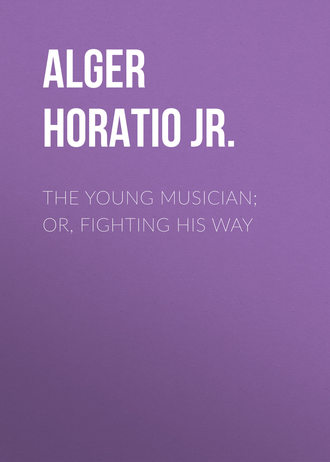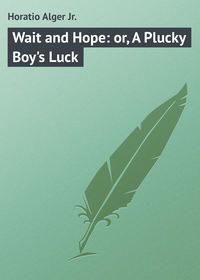
The Young Musician; Or, Fighting His Way
“That isn’t all,” continued Carrie. “Mr. Turner says it is very kind of Mr. Gray—”
“Mr. Gray!” repeated the squire, amused.
“Well, Philip, then. I suppose you call him Philip, as you are his guardian.”
“Well, what were you going to say?”
“Mr. Turner says that it is very kind of Philip to play for so little, for he made a good deal more money by his entertainment in Wilkesville.”
“Did he give a concert in Wilkesville?” asked the squire quickly.
“Yes, he and the professor. He was liked very much there.”
“And you heard that he made a good deal of money there?”
“Yes; lots of it.”
“Then,” thought the squire, “he must have considerable money with him. As his guardian I ought to have the care of it. He’s a boy, and isn’t fit to have the charge of money. It’s very lucky I came here just as I did. It’s my duty, as his guardian, to look after him.”
The squire determined to seek an interview with our hero as soon as the entertainment was over.
CHAPTER XXXVI. THE PRETENDED GUARDIAN
Philip played with excellent effect, and his efforts were received with as much favor at Knoxville as at Wilkesville. He was twice encored, and at the end of each of his selections he was greeted with applause.
As for Professor Riccabocca, people hardly knew what to make of him. He was as eccentric and extravagant as ever, and his recitations were received with good-natured amusement. He didn’t lack for applause, however. There were some boys on the front seats who applauded him, just for the fun of it. Though the applause was ironical, the professor persuaded himself that it was genuine, and posed before the audience at each outburst, with his hand on his heart, and his head bent so far over that he seemed likely to lose his balance.
“We are making a grand success, Mr. Gray,” he said, during the interval of ten minutes already referred to. “Did you notice how they applauded me?”
“Yes,” answered Philip, with a smile.
“They evidently appreciate true genius. It reminds me of the ovation they gave me at Cincinnati last winter.”
“Does it?” asked Philip, still smiling.
“Yes. I was a great favorite in that intellectual city. By the way, I noticed that they seemed well pleased with your playing also.”
This he said carelessly, as if Philip’s applause was not to be compared to his.
“Yes, they treat me very kindly,” answered Philip.
“You are fortunate in having me to introduce you to the public,” said the professor emphatically. “The name of Riccabocca is so well known, that it is of great advantage to you.”
The professor deluded himself with the idea that he was a great elocutionist, and that the public rated him as highly as he did himself. When anything occurred that did not seem to favor this view, he closed his eyes to it, preferring to believe that he was a popular favorite.
“I hope I shall never be so deceived about myself,” thought Philip.
When the entertainment was over, Mr. Caswell, president of the club, came up to Philip and said cordially:
“Mr. Gray, we are very much indebted to you. Thanks to you, we are out of debt, and shall have a balance of from twelve to fifteen dollars in the treasury.”
“I am very glad of it,” said Philip.
“So am I,” said the professor, pushing forward, jealous lest Philip should get more than his share of credit.
“And we are indebted to you also, Professor Riccabocca,” said the president, taking the hint.
“You are entirely welcome, sir,” said Riccabocca loftily. “My help has often been asked in behalf of charitable organizations. I remember once, in Philadelphia, I alone raised five hundred dollars for a—a—I think it was a hospital.”
This was an invention, but Professor Riccabocca had no scruple in getting up little fictions which he thought likely to redound to his credit and increase his reputation.
“Doubtless you are often called upon also, Mr. Gray,” suggested Mr. Caswell with a smile.
“No,” answered Philip. “This is the first time that I have ever had the opportunity.”
“There’s no humbug about the boy,” thought Mr. Caswell. “As for the professor, he is full of it.”
“I have pleasure in handing you the price agreed upon,” said the president, presenting each with a ten-dollar bill.
“Thank you,” said Philip.
Professor Riccabocca carelessly tucked the bill into his vest pocket, as if it were a mere trifle.
At this moment, Mr. Turner came up with all the other gentleman. “Mr. Gray,” he said, “here is a gentleman who wishes to speak to you.”
Philip looked up, and saw the well-known figure of Squire Pope.
CHAPTER XXXVII. HIS OWN MASTER
“Ahem, Philip,” said the squire. “I should like a little conversation with you.”
“Good evening, Squire Pope,” said our hero, not pretending to be cordial, but with suitable politeness.
“I didn’t expect to see you here,” pursued the squire.
“Nor I you, sir.”
“I am visiting my sister, Mrs. Cunningham, who lives in Knoxville. Will you come around with me, and make a call?”
Now, considering the treatment which Philip had received from the squire before he left Norton, the reader can hardly feel surprised that our hero didn’t care to trust himself with his unscrupulous fellow townsman.
“Thank you, Squire Pope,” said Philip, “but it is rather late for me to call at a private house. I am staying at the hotel, and if you will take the trouble to go around there with me, we will have a chance to converse.”
“Very well,” said the squire, hesitating. Just then up came his niece, Carrie, who was determined to get acquainted with Philip.
“Uncle,” she said, “introduce me to Mr. Gray.”
“This is my niece, Caroline Cunningham,” said the squire stiffly.
“I am glad to meet Miss Cunningham,” said Philip, extending his hand, with a smile.
“What a lovely player you are, Mr. Gray!” she said impulsively.
“I am afraid you are flattering me, Miss Cunningham.”
“Don’t call me Miss Cunningham. My name is Carrie.”
“Miss Carrie, then.”
“I was ever so much surprised to hear that uncle was your guardian.”
Philip looked quickly at the squire, but did not contradict it. He only said:
“We used to live in the same town.”
During this conversation Squire Pope looked embarrassed and impatient.
“It’s getting late, Carrie,” he said. “You had better go home.”
“Aren’t you coming, too, uncle?”
“I am going to the hotel to settle some business with Philip.”
“What business, I wonder?” thought our hero.
Arrived at the hotel, they went up-stairs to Philip’s chamber. “You left Norton very abruptly, Philip,” commenced the squire.
“There was good reason for it,” answered Philip significantly.
“It appears to me you are acting as if you were your own master,” observed the squire.
“I am my own master,” replied Philip firmly.
“You seem to forget that I am your guardian.”
“I don’t forget it, for I never knew it,” said our hero.
“It is generally understood that such is the case.”
“I can’t help it. I don’t need a guardian, and shall get along without one.”
“Ahem! Perhaps that isn’t to be decided by you.”
“If I am to have a guardian, Squire Pope,” said Philip bluntly, “I sha’n’t select you. I shall select Mr. Dunbar.”
“I have much more knowledge of business than Mr. Dunbar,” said the squire, shifting his ground.
“That may be, but there is one important objection.”
“What is that?”
“You are not my friend, and Mr. Dunbar is.”
“Really this is very extraordinary!” ejaculated the squire. “I am not your friend? How do you know that?”
“You tried to make a pauper out of me, when, as you must perceive, I am entirely able to earn my own living.”
“Is it true that you were paid ten dollars for playing this evening?” asked the squire curiously.
“Yes, sir.”
“It beats all!” said the squire, in amazement.
“Yet you wanted to sell my violin for a good deal less than I have earned in one evening,” said Philip, enjoying his enemy’s surprise.
“You gave an entertainment at Wilkesville also, I hear?”
“Yes, sir.”
“Did you make as much there?”
“I made between sixty and seventy dollars over and above expenses.”
“You don’t expect me to believe that!” said the squire.
“I don’t care whether you believe it or not; it’s true.”
“Have you got the money with you?”
“Yes.”
“Then you’d better give it to me to keep for you.”
“Thank you; I feel capable of taking care of it myself.”
“But it’s improper for a boy of your age to carry round so much money,” said the squire sharply.
“If I need help to take care of it, I will ask Mr. Dunbar.”
“Come, Philip,” said the squire, condescending to assume a persuasive manner, “you must remember that I am your guardian.”
“I dispute that,” said Philip.
“I won’t insist upon your going back with me to Norton, as long as you are able to support yourself.”
“Then you wouldn’t advise me to go back to the poorhouse,” said Philip, with some sarcasm in his voice.
“I didn’t mean to have you stay there long,” said the squire, rather confused. “You’d better give me most of your money, and I’ll take care of it for you, and when you’re twenty-one you’ll have quite a little sum.”
“I am much obliged to you, sir, but I won’t put you to the trouble of taking care of my money,” answered Philip coldly.
Squire Pope continued to argue with Philip, but made no impression. At length he was obliged to say good night.
“I will call round in the morning,” he said, at parting. “Perhaps you’ll listen to reason then.”
When he called round in the morning he learned to his disappointment that Philip was gone.
CHAPTER XXXVIII. AN OFFER DECLINED
After his interview with Squire Pope, Philip came down to the office, where he saw Professor Riccabocca, apparently waiting for him.
“Well, Mr. Gray, where shall we go next?” asked the professor, with suavity.
“I haven’t decided where to go—have you?” asked Philip coolly.
“I suppose we had better go to Raymond. That is a good-sized place. I think we can get together a good audience there.”
“You seem to be under the impression that we are in partnership,” said Philip.
“Of course,” answered Riccabocca.
“I have made no agreement of that sort, professor.”
“But, of course, it is understood,” said Riccabocca quickly, “as long as we draw so well.”
“You must excuse me, Professor Riccabocca. I must decline the proposal.”
“But why?” inquired the professor anxiously.
“I hope you won’t press me for an explanation.”
“But I do. I can’t understand why you should act so against your own interest. You can’t expect people will come just to hear you play. You need me to help you.”
“It may be as you say, professor, but if you insist upon my speaking plainly, I don’t care to travel with a man who has treated me as you have.”
“I don’t understand you,” said Riccabocca nervously; but it was evident, from his expression, that he did.
“Then you seem very forgetful,” said Philip. “You tried to deprive me of my share of the proceeds of the entertainment at Wilkesville, and would have succeeded but for a lucky accident.”
“I told you that it was all owing to neuralgia,” said Professor Riccabocca. “I had such an attack of neuralgic headache that it nearly drove me wild.”
“Then,” said Philip, “I would rather find a partner who is not troubled with neuralgic headache. I think it would be safer.”
“It won’t happen again, Mr. Gray, I assure you,” said the professor apologetically.
He endeavored to persuade Philip to renew the combination, but our hero steadily refused. He admitted that it might be to his pecuniary advantage, but he had lost all confidence in the eminent professor, and he thought it better to part now than to give him another opportunity of playing a similar trick upon him.
The professor thereupon consulted the landlord as to whether it would be advisable for him to give another entertainment unaided, and was assured very emphatically that it would not pay expenses.
“You make a great mistake, Mr. Gray,” said Riccabocca. “It would be a great advantage for you to have my assistance at this stage of your professional career.”
“I don’t expect to have any professional career,” answered Philip.
“Don’t you intend to become a professional musician?” asked the professor, surprised.
“Probably not. I have only been playing because I needed money, and my violin helped me to a living.”
“You can’t make as much money in any other way.”
“Not at present; but I want to get a chance to enter upon some kind of business. I am going to New York.”
“You will some time have a chance to hear me there, in the Academy of Music,” said Riccabocca pompously.
“I will go and hear you,” said Philip, laughing, “if I can afford a ticket.”
“Say the word and we will appear there together, Mr. Gray.”
“I think not, professor.”
In fact, though Philip had found himself unexpectedly successful as a musician, he knew very well that he was only a clever amateur, and that years of study would be needed to make him distinguished.
He was glad that he had the means of paying his expenses for a considerable time, and had in his violin a trusty friend upon which he could rely in case he got into financial trouble. Directly after breakfast he set out on his journey.
CHAPTER XXXIX. AN AMBITIOUS WAYFARER
The large sums which Philip had received for his playing might have dazzled a less sensible boy. He was quite conscious that he played unusually well for a boy, but when it came to selecting music as a profession, he felt it would not be wise to come to too hasty a decision. To be a commonplace performer did not seem to him very desirable, and would not have satisfied his ambition.
He had told Professor Riccabocca that he intended to go to New York. This design had not been hastily formed. He had heard a great deal of the great city in his home in the western part of the State of which it was the metropolis, and he was desirous of seeing it. Perhaps there might be some opening for him in its multitude of business houses.
Philip had plenty of money, and could easily have bought a railroad ticket, which would have landed him in New York inside of twenty-four hours, for he was only about four hundred miles distant; but he was in no hurry, and rather enjoyed traveling leisurely through the country towns, with his violin in his hand.
It reminded him of a biography he had read of the famous Doctor Goldsmith, author of the “Vicar of Wakefield,” who made a tour on the continent of Europe, paying his way with music evoked from a similar instrument.
Three days later, he found himself on the outskirts of a village, which I will call Cranston. It was afternoon, and he had walked far enough to be tired.
He was looking about for a pleasant place to lounge, when his attention was drawn to a boy of about his own age, who was sitting on the stone wall under a large tree.
He was rather a slender boy, and had originally been well dressed, but his suit was travel-stained, and covered with dust.
Now, boys have a natural attraction for each other, and Philip determined to introduce himself to the stranger. This he did in boy-fashion, by saying:
“Hello!”
“Hello!” said the stranger, looking up.
But he spoke slowly and wearily, and to Philip he seemed out of spirits.
“Do you live in Cranston?” asked Philip, taking a seat beside the other boy, upon the top of the stone wall.
“No; do you?”
“No.”
“Where do you live?”
“I don’t live anywhere just at present,” answered Philip, with a smile. “I am traveling.”
“So am I,” said the other boy.
“I am traveling to New York,” Philip continued.
“And I am traveling from there,” said his new acquaintance.
Then both boys surveyed each other curiously.
“What’s your name?” asked the stranger.
“Philip Gray. What’s your’s?”
“Mine is Henry Taylor. What have you got there?”
“A violin.”
“Do you play on it?”
“Yes; a little.”
“I should think you’d be tired lugging it round.”
Philip smiled.
“It is about all the property I have,” he said; “so it won’t do for me to get tired of it.”
“You’re richer than I am, then,” said Henry.
“Are you poor, then?” asked Philip, in a tone of sympathy.
“I haven’t got a cent in my pocket, and I haven’t had anything to eat since breakfast.”
“Then I’m glad I met you,” said Philip warmly. “I will see that you have a good supper. How long is it since you left New York?”
“About a week.”
“What made you leave it?”
Henry Taylor hesitated, and finally answered, in a confused tone:
“I’ve run away from home. I wanted to go out West to kill Indians.”
Philip stared at his new acquaintance in astonishment.
CHAPTER XL. THE INDIAN HUNTER
Philip had lived so long in a country village that he had never chanced to read any of those absorbing romances in which one boy, of tender years, proves himself a match for a dozen Indians, more or less, and, therefore, he was very much amazed at Henry Taylor’s avowal that he was going out West to kill Indians.
“What do you want to kill Indians for?” he asked, after an astonished pause.
Now it was Henry’s turn to be astonished.
“Every boy wants to kill Indians,” he answered, looking pityingly at our hero.
“What for? What good will it do?” asked Philip.
“It shows he’s brave,” answered his new friend. “Didn’t you ever read the story of ‘Bully Bill’; or, The Hero of the Plains’?”
“I never heard of it,” said Philip.
“You must have lived in the woods, then,” said Henry Taylor, rather contemptuously. “It’s a tip-top story. Bully Bill was only fourteen, and killed ever so many Indians—twenty or thirty, I guess—as well as a lot of lions and bears. Oh, he must have had lots of fun!”
“Why didn’t the Indians kill him?” asked Philip, desirous of being enlightened. “They didn’t stand still and let him kill them, did they?”
“No; of course not. They fought awful hard.”
“How did one young boy manage to overcome so many Indians?”
“Oh, you’ll have to read the story to find out! Bully Bill was a great hero, and everybody admired him.”
“So you wanted to imitate his example?” asked Philip.
“To be sure I did.”
“How did you happen to get out of money?”
“Well,” said Henry, “you see me and another boy got awful excited after reading the story, and both concluded nothing could make us so happy as to go out West together, and do as Bill did. Of course, it was no use to ask the old man—”
“The old man?” queried Philip.
“The gov’nor—father, of course! So we got hold of some money—”
“You got hold of some money?” queried Philip.
“That’s what I said, didn’t I?” rejoined Henry irritably.
“Yes.”
“Then what’s the use of repeating it?”
Philip intended to ask where or how Henry got hold of the money, but he saw pretty clearly that this would not be agreeable to his new acquaintance. Though without much experience in the world, he suspected that the money was not obtained honestly, and did not press the question.
“Well, me and Tom started about a week ago. First of all, we bought some revolvers, as, of course, we should need them to shoot Indians. They cost more than we expected, and then we found it cost more to travel than we thought.”
“How much money did you have?”
“After paying for our revolvers, Tom and me had about thirty dollars,” said Henry.
“Only thirty dollars to go west with!” exclaimed Philip, in amazement.
“Why, you see, the revolvers cost more than we expected. Then we stopped at a hotel in Albany, where they charged us frightfully. That is where Tom left me.”
“Tom left you at Albany?”
“Yes, he got homesick!” said Henry contemptuously. “He thought we hadn’t money enough, and he said he didn’t know as he cared so much about killing Indians.”
“I agree with Tom,” said Philip. “I don’t think I should care very much about killing Indians myself, and I should decidedly object to being killed by an Indian. I shouldn’t like to be scalped. Would you?”
“Oh, I’d take care of that,” said Henry. “I wouldn’t let them have the chance.”
“It seems to me the best way would be to stay at home,” said Philip, smiling.
“If I stayed at home I’d have to go to school and study. I don’t care much about studying.”
“I like it,” said Philip. “So Tom left you, did he?”
“Yes; but I wasn’t going to give up so easy. He took half the money that was left, though I thought he ought to have given it to me, as I needed it more. I wasn’t going home just as I’d started.”
“Then you’ve spent all your money now?”
“Yes,” answered Henry gloomily. “Have you got much money?” he asked, after a pause.
“Yes, I have about a hundred dollars-say, ninety-five.”
“You don’t mean it!” ejaculated Henry, hie eyes sparkling.
“Yes, I do.”
“How did you get it?”
“I earned most of it by playing on the violin.”
“I say,” exclaimed Henry, in excitement, “suppose you and me go into partnership together, and go out West—”
“To kill Indians?” asked Philip, smiling.
“Yes! With all that money we’ll get along. Besides, if we get short, you can earn some more.”
“But what advantage am I to get out of it? I am to furnish all the capital and pay all expenses, as far as I can understand. Generally, both partners put in something.”
“I put in my revolver,” said Henry.
“One revolver won’t do for us both.”
“Oh, well, you can buy one. Come, what do you say?” asked Henry eagerly.
“Let me ask you a few questions first. Where does your father live?”
“In New York.”
“What is his business?”
“He is a broker in Wall Street.”
“I suppose he is rich?”
“Oh, he’s got plenty of money, I expect! We live in a nice house on Madison Avenue. That’s one of the best streets, I suppose you know!”
“I never was in New York. Is your mother living?”
“No,” answered Henry. “She died three years ago.”
If his mother had been living, probably the boy would never have made such an escapade, but his father, being engrossed by business cares, was able to give very little attention to his son, and this accounts in part for the folly of which he had been guilty.
“Have you got any brothers or sisters?” he asked.
“I have one sister, about three years younger than I. Her name is Jennie.”
“I wish I were as well off as you,” said Philip.
“How do you mean?”
“I mean I wish I had a father and sister.”
“Haven’t you?”
“My father is dead,” said Philip gravely, “and I never had a sister.”
“Oh, well, I don’t know as I’m so lucky,” said Henry. “Sisters are a bother. They want you to go round with them, and the old man is always finding fault.”
Philip’s relations with his father had always been so affectionate that he could not understand how Henry could talk in such a way of his.
“I don’t know what makes you ask me such a lot of questions,” said Henry, showing impatience. “Come, what do you say to my offer?”
“About forming a partnership?”
“Yes.”
“I’d rather not—in that way.”
“In what way?”
“I mean for the purpose of going out West to kill Indians.”
“You’ve no idea what fun it would be,” said Henry, disappointed.
“No, I suppose not,” said Philip, smiling.
“Then I suppose I shall have to give it up,” said Henry.
“Now I have a proposal to make to you,” said Philip.
“What is it?”
“If you agree to go home, I’ll pay your expenses and go along with you. I’ve never been to New York, and I’d like to have some one with me that could show me round the city.”
“I can do that,” said Henry. “I know the way all about.”
“Then will you agree?”
“Yes.”
“Then come along, and we’ll stop at the first convenient place and get some supper.”
CHAPTER XLI. AN ADVENTURE IN THE WOODS
“I shall do a good thing if I induce Henry to go home,” thought Philip. “That is rather a queer idea of his about wanting to kill Indians. It seems to me as much murder to kill an Indian as any one else.”
He only thought this, but did not express it, as he did not care to get into a discussion with his new acquaintance, lest the latter should recall his consent to go home.









